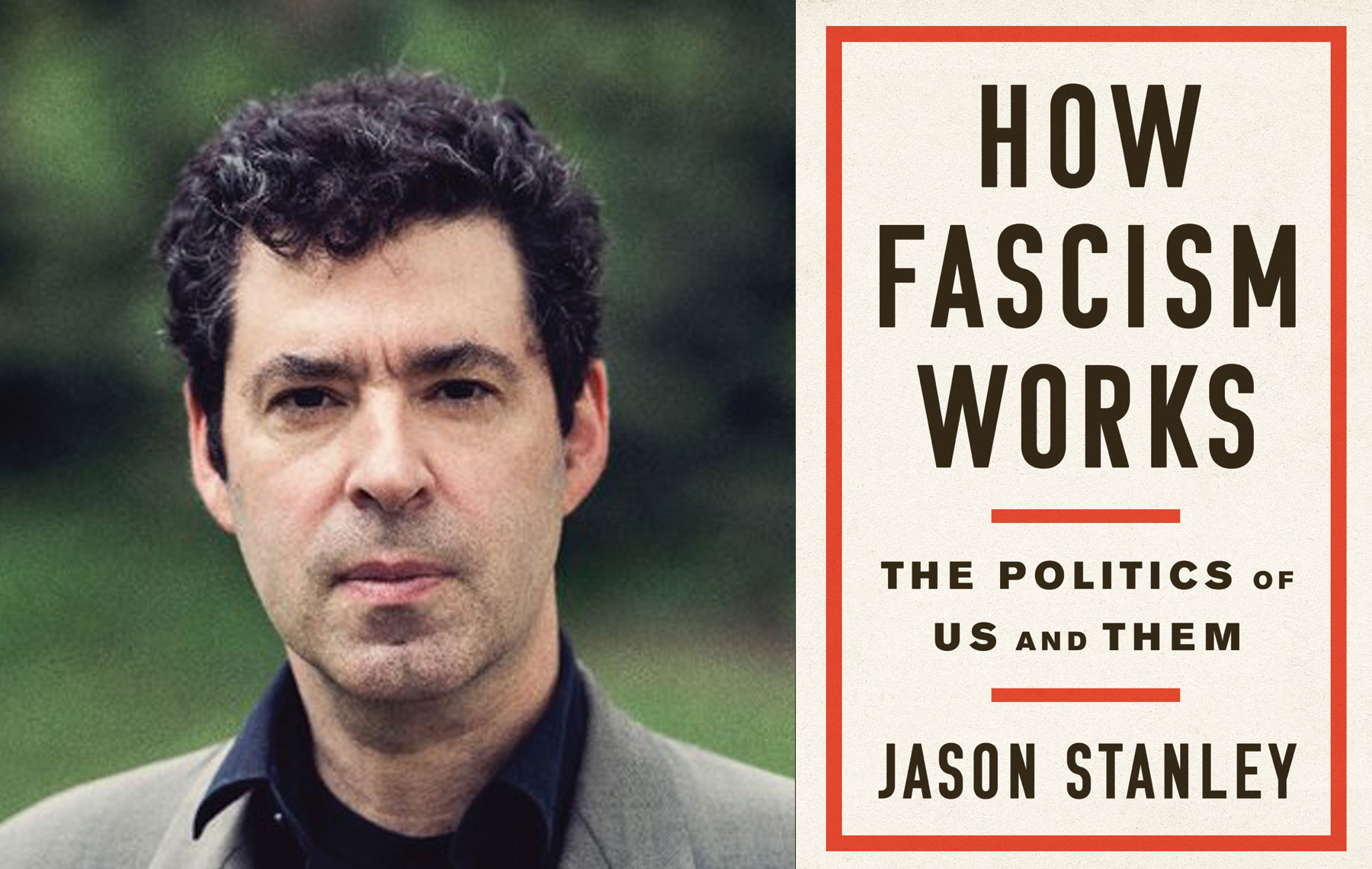
At one fleeting moment in the coverage of the killings at Pittsburgh’s Tree of Life Synagogue, a young Jewish couple on a TV news broadcast were describing what they saw as law enforcement officers swarmed through their neighborhood to confront the shooter. As the interview ended and the correspondent edged them out of the shot, the wife managed to utter one last word before she disappeared from the screen.
“Vote!” she implored.
At that moment, the release of the latest book by Jason Stanley, “How Fascism Works: The Politics of Us and Them,” seemed particularly well-timed.
Stanley is the Jacob Urowsky Professor of Philosophy at Yale University. His previous books include “How Propaganda Works,” and he is a frequent contributor to The New York Times and The Washington Post. He may be a credentialed philosopher, but he has a sure grasp of both history and politics. Above all, he understands how history penetrates and distorts politics — a phenomenon taking place before our very eyes.
When Stanley’s parents arrived in the United States in 1939 as refugees from Nazi Germany, for example, “America First” was the phrase on the lips of the isolationists who were perfectly comfortable letting Adolf Hitler do whatever he wanted with both the Jewish citizens of Germany and the democracies that were Germany’s neighbors. When the same phrase is adopted as a mantra by our current president, Stanley argues, it carries the same hateful associations. That’s why, as he points out, Steve Bannon told the Hollywood Reporter in 2016 that the Donald Trump era “will be as exciting as the 1930s,” that is, “the era when the United had its most sympathy for fascism.”
“Fascism” is a fighting word, of course, but Stanley is careful to define his terms. “I have chosen the label ‘fascism’ for ultranationalism of some variety (ethnic, religious, cultural), with the nation represented in the person of an authoritarian leader who speaks on its behalf,” he explains. “As Donald Trump declared in his Republican National Convention speech in July 2016, ‘I am your voice.’” When we hear Trump proudly and defiantly call himself a nationalist, Stanley’s dissection of fascist politics puts us on notice: “Nationalism is at the core of fascism,” he writes. “The fascist leader employs a sense of collective victimhood to create a sense of group identity that is by its nature opposed to the cosmopolitan ethos and individualism of liberal democracy.”
Helpfully, Stanley compiles a list of 10 elements that characterize fascism regardless of the name by which it is called. All of them are worth pondering when viewing the American landscape on the eve of the Nov. 6 midterm elections. One element is “creating a mythic past to support their vision for the present,” which readily brings to mind the cherished slogan of Trumpism, “Make America Great Again.” Another element is “law and order” of a very specific coloring, that is, contrasting “the pure values and traditions of the nation” with “the hordes of minorities who live there, emboldened by liberal tolerance.” A third is a cynical disregard for the truth, whether it is the “Big Lie” that Hitler forced down the throats of his followers or the more recent lies that have been told about the size of the crowd at Trump’s presidential inauguration or the concessions to nuclear disarmament that were supposedly made in a secret meeting between the American president and the dictator of North Korea. “In order to honestly debate what our country should do, what policies it should adopt, we need a common basis of reality,” Stanley warns.
But Stanley also boils down the ugly brew of fascism to its essential message. “The most telling symptom of fascist politics is division,” Stanley writes. “It aims to separate a population into an ‘us’ and a ‘them.’” For Trump, by way of example, “them” is a grab-bag category that includes Muslims, Mexicans, the Democratic “mob,” environmental scientists, and transgender soldiers and sailors, among many others. And the next step in the deadly logic of fascism is a conspiracy theory that blames “them” for the exercise of secret and uncontrollable power over the majority. “Conspiracy theories are tools to attack those who would ignore their existence; by not covering them, the media is made to appear biased and ultimately part of the very conspiracy they refuse to cover,” Stanley observes.
Stanley is not a panic-maker, and he acknowledges that we need to be cautious in applying the label of fascism to our political adversaries. “Fascism today might not look exactly as it did in the 1930s, but refugees are once again on the road everywhere,” he observes, reminding us that history appears to be repeating itself. By calling to mind the failure of German democracy in 1933 — and the cowardice of Great Britain and France in 1938 — he reminds that we must be vigilant and courageous in defending our American democracy.
“Some may complain about overreacting in the arguments I make, or object that the contemporary examples are not sufficiently extreme to juxtapose against the crimes of history,” he concedes. But he warns against the “normalization of extreme politics” that Trump represents; after all, Trump has said so many vile things that were once unspeakable in American politics that some people have lost the capacity to be surprised or outraged. “What normalization does is transform the morally extraordinary into the ordinary,” he writes. “It makes us able to tolerate what was once intolerable by making it seem as if this is the way things have always been.”
“How Fascism Works” could not be more timely or more crucial. The mail-bomber who targeted the Democrats on Trump’s enemies list, and the shooter who killed 11 Jews at the Pittsburgh synagogue because they were Jews, are examples of what can happen when haters are encouraged by our political celebrities to crawl out from under the rocks that once concealed them. As Jews in America, we ignore threats to democracy at our deadly peril. And, as Jews in America, “How Fascism Works” underscores the plea of the young woman in Squirrel Hill: “Vote!”
Jonathan Kirsch, author and publishing attorney, is the book editor of the Jewish Journal.























 More news and opinions than at a Shabbat dinner, right in your inbox.
More news and opinions than at a Shabbat dinner, right in your inbox.